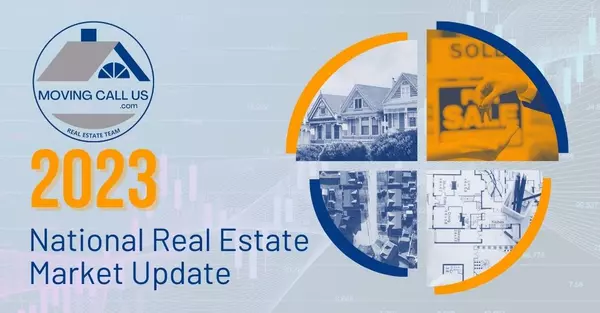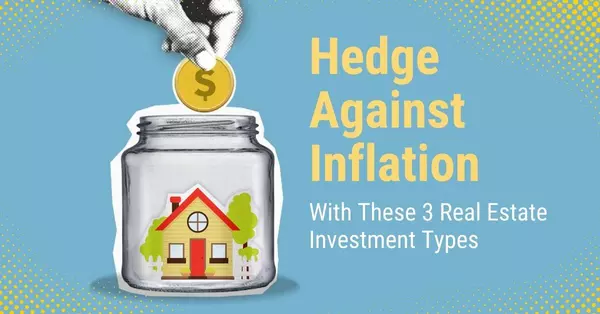National Real Estate Market Update for 2023

National Real Estate Market Update for 2023 There’s an old adage in real estate: location, location, location. But ever since the Federal Reserve began its series of inflation-fighting interest rate hikes last year, a new mantra has emerged: mortgage rates, mortgage rates, mortgage rates. Higher rates had the immediate impact of dampening homebuyer affordability and demand. But this year, we’re seeing further repercussions. While analysts expected listing inventory to swell as sales declined, instead, homeowners have been pushing off plans to sell because they feel beholden to their existing, lower mortgage rates. So what impact is this reduced demand and low supply environment having on home values? And what can we expect from the real estate market in the coming months and years? Here are several key indicators that help to paint a picture of the current market and where it’s likely headed. HOME SALES ARE EXPECTED TO PICK UP BY EARLY NEXT YEAR The weather isn’t the only thing that heats up in the spring and summer. Nationally, it tends to be the busiest time in real estate. But this year, the peak season got off to a slow start, with sales declines in both March and April.1,2 Existing home sales in April were down 3.4% from the previous month—and 23.2% from a year earlier.2 What’s causing this market slowdown? Industry experts attribute it to several factors, including near-record home prices, high mortgage rates, and low inventory. According to National Association of Realtors (NAR) Chief Economist Lawrence Yun, “Home sales are trying to recover and are highly sensitive to changes in mortgage rates. Yet, at the same time, multiple offers on starter homes are quite common, implying more supply is needed to fully satisfy demand. It's a unique housing market.”1 However, some industry experts believe the market is poised for a comeback. Forecasters at the Mortgage Bankers Association (MBA) predict that home sales will continue to fall through Q3 before rising in Q4 and throughout next year.3 Analysts at Fannie Mae expect the recovery to take a bit longer, picking up in early 2024. Meanwhile, home builder confidence is already up, as purchases of new single-family homes surged in March and April to a 13-month high.5 Builder incentives are helping to boost sales: According to the National Association of Home Builders, in May, 54% reported using them to win over budget-conscious buyers.6 What does it mean for you? A slower pace of sales has given buyers some breathing room. If you hated the frenzy of the pandemic-era real estate market, now might be a better time for you to shop for a home. We can help you evaluate your options and make an informed purchase. If you plan to sell your home, prepare yourself for less foot traffic and a longer sales timeline than you may have found a year ago. It will also be crucial to enlist the help of a skilled agent who knows how to draw in buyers. Reach out for a copy of our multi-step Property Marketing Plan. PROPERTY VALUES REMAIN RELATIVELY STABLE Some good news for buyers: While home builder sales climbed in April, the median new-house price fell to $420,800, an 8.2% decrease from a year ago.5 Meanwhile, the median existing-home price dropped to $388,800, down 1.7% year-over-year. Notably, existing-home prices rose in parts of the country but fell in the South and West.2 “Roughly half of the country is experiencing price gains,” explains Yun. “Multiple-offer situations have returned in the spring buying season following the calmer winter market. Distressed and forced property sales are virtually nonexistent.”2 The average national home price remains about 40% higher than it was in early 2020, according to the S&P CoreLogic Case-Shiller index.7 A tight housing supply has helped to buoy prices amidst a slowdown in sales. “While it varies from region to region, home prices at the national level may fall 1% or 1.5% by the end of the year, so not much,” Doug Duncan, senior vice president and chief economist at Fannie Mae, told Yahoo Finance in April.8 Record levels of home equity will help to stabilize the sector and prevent a wave of foreclosures, even as prices moderate, according to Mark Zandi, chief economist at Moody’s Analytics.9 “But for those who have owned a home for more than a year or two, their home will remain a rock-solid investment. And once affordability is restored, the next generation of households can become homeowners. Getting there is critical to the financial well-being of those households, their communities, and the broader economy,” writes Zandi in The Washington Post.9 What does it mean for you? Prices have softened in certain market segments—and motivated sellers are out there and willing to make deals. We can help you find your next home and negotiate a great price. If you’re a homeowner, the surge in home values has slowed, but you’re likely still sitting on a nice pile of equity. Reach out for a free assessment to find out how much your home is currently worth. LISTING INVENTORY IS LOW, BUT NEW CONSTRUCTION IS ON THE RISE Unsold existing home inventory rose 7.2% from March to April, according to NAR. At the current level of demand, this equates to 2.9 months of supply, which is still well below the 5 to 6 months of inventory required for a “balanced” market.2 Inventory remains tight despite the market slowdown because many would-be sellers are reluctant to give up their lower mortgage rates. “Affordability is not only an issue for first-time homebuyers, but also for many repeat buyers who still need to take on a mortgage,” explains Danielle Hale, chief economist for Realtor.com.10 In a recent survey by the home listing site, 82% of respondents who are planning to both buy and sell a home said they feel “locked in” by their low rate.11 In some areas, new home construction is helping to fill the supply gap. “Currently, one-third of housing inventory is new construction, compared to historical norms of a little more than 10%,” according to National Association of Home Builders Chief Economist Robert Dietz.12 And more new homes are in the pipeline, after a builder slowdown last year. Single-family housing starts rose 1.6% from March to April (seasonally adjusted) and new construction permits hit a seven-month high.13 What does it mean for you? Inventory remains tight, but less competition means more choice and negotiating power for buyers. If you’ve had trouble finding a home in the past, it may be time to take another look. We can help you explore both new and existing homes in our area. Sellers are enjoying reduced competition right now, as well. However, the longer you wait to list, the more competition you’re likely to face. And if you feel locked in by your current, lower mortgage rate, consider this: If you roll your equity gains into a down payment on your next home, you could possibly lower your monthly payment. Reach out to discuss your options. MORTGAGE RATES MAY FINALLY COME DOWN According to Freddie Mac, the average 30-year fixed-rate mortgage hit a peak of 7.08% in the fourth quarter of 2022, and since then it’s primarily floated between 6 and 7%.14 However, there are signs that rates could trend lower later this year. “Calmer inflation means lower mortgage rates, eventually,” Yun predicted in a recent statement. “Mortgage rates slipping down to under 6% looks very likely toward the year’s end.”15 Other leading economists agree. In its May forecast, Fannie Mae speculates that 30-year fixed mortgage rates will continue to decline, averaging 6.0% in Q4 2023 and 5.4% by Q4 2024.4 Meanwhile, the MBA predicts rates will fall even faster, averaging 5.6% by Q4 2023 and 4.8% by Q4 2024.3 On May 3, the Federal Reserve raised its benchmark borrowing rate by another quarter point—its 10th consecutive increase since March 2022. However, in its corresponding statement, the Fed omitted language from its previous release about “additional policy firming,” leaving some analysts to speculate that the rate hikes may be over.16 Although mortgage rates aren’t directly tied to the federal funds rate, a decision by the Fed to pause rate increases could have a positive effect. In the meantime, buyers should shop around multiple lenders to find the best rate—and buckle up for what could be an exciting ride. What does it mean for you? Mortgage rates may finally trend down, which would be great news for buyers. But, a decrease in rates could correspond with an increase in competition and prices. If you start searching now, you’ll be prepared to make an offer when the time is right. We can help you negotiate a great deal and potential seller incentives. If you’re planning to sell, this is good news for you, too. But, there are several factors to consider when determining the right time to list your home. Reach out for a consultation so we can help you chart the best course. WE’RE HERE TO GUIDE YOU While national real estate forecasts can provide a “big picture” outlook, real estate is local. And as local market experts, we can guide you through the ins and outs of our market and the issues most likely to impact sales and drive home values in your particular neighborhood. If you’re considering buying or selling a home, contact us now to schedule a free consultation. We’ll work with you to develop an action plan to meet your real estate goals. The above references an opinion and is for informational purposes only. It is not intended to be financial, legal, or tax advice. Consult the appropriate professionals for advice regarding your individual needs. Sources: National Association of Realtors -https://www.nar.realtor/newsroom/existing-home-sales-slid-2-4-in-march National Association of Realtors -https://www.nar.realtor/newsroom/existing-home-sales-faded-3-4-in-april Mortgage Bankers Association -https://www.mba.org/docs/default-source/research-and-forecasts/forecasts/2023/mortgage-finance-forecast-may-2023.pdf?sfvrsn=4bf1d1a7_1 Fannie Mae -https://www.fanniemae.com/media/47006/display S. Census Bureau - https://www.census.gov/construction/nrs/current/index.html National Association of Home Builders -https://www.nahb.org/news-and-economics/press-releases/2023/05/lack-of-existing-inventory--boosts-builder-confidence-to-key-marker New York Times -https://www.nytimes.com/2023/04/29/business/spring-housing-market.html? Yahoo Finance -https://finance.yahoo.com/news/mortgage-rates-increase-after-weeks-of-declines-160015631.html The Washington Post -https://www.washingtonpost.com/business/2023/04/22/housing-prices-put-some-out-of-the-market/ CNBC -https://www.cnbc.com/2023/04/20/home-sales-fell-in-march-amid-volatility-in-mortgage-rates.html com -https://www.realtor.com/research/2023-q1-sellers-survey-btts/ National Association of Home Builders - https://www.nahb.org/news-and-economics/press-releases/2023/04/lack-of-existing-inventory-continues-to-support-builder-sentiment United State Census Bureau -https://www.census.gov/construction/nrc/pdf/newresconst.pdf Freddie Mac -https://www.freddiemac.com/pmms National Association of Realtors - https://www.nar.realtor/blogs/economists-outlook/instant-reaction-inflation-april-12-2023 CNBC - https://www.cnbc.com/2023/05/03/fed-rate-decision-may-2023-.html
Read MoreTake Advantage of Your Home Equity: A Homeowner’s Guide

Take Advantage of Your Home Equity: A Homeowner’s Guide Homeownership offers many advantages over renting, including a stable living environment, predictable monthly payments, and the freedom to make modifications. Neighborhoods with high rates of homeownership have less crime and more civic engagement. Additionally, studies show that homeowners are happier and healthier than renters, and their children do better in school.1 But one of the biggest perks of homeownership is the opportunity to build wealth over time. Researchers at the Urban Institute found that homeownership is financially beneficial for most families,2 and a recent study showed that the median net worth of homeowners can be up to 80 times greater than that of renters in some areas.3 So how does purchasing a home help you build wealth? And what steps should you take to maximize the potential of your investment? Find out how to harness the power of home equity for a secure financial future. WHAT IS HOME EQUITY? Home equity is the difference between what your home is worth and the amount you owe on your mortgage. So, for example, if your home would currently sell for $250,000, and the remaining balance on your mortgage is $200,000, then you have $50,000 in home equity. $250,000 (Home’s Market Value) - $200,000 (Mortgage Balance) ______________________________ $50,000 (Home Equity) The equity in your home is considered a non-liquid asset. It’s your money; but rather than sitting in a bank account, it’s providing you with a place to live. And when you factor in the potential of appreciation, an investment in real estate will likely offer a better return than any savings account available today. HOW DOES HOME EQUITY BUILD WEALTH? A mortgage payment is a type of “forced savings” for home buyers. When you make a mortgage payment each month, a portion of the money goes towards interest on your loan, and the remaining part goes towards paying off your principal, or loan balance. That means the amount of money you owe the bank is reduced every month. As your loan balance goes down, your home equity goes up. Additionally, unlike other assets that you borrow money to purchase, the value of your home generally increases, or appreciates, over time. For example, when you pay off your car loan after five or seven years, you will own it outright. But if you try to sell it, the car will be worth much less than when you bought it. However, when you purchase a home, its value typically rises over time. So when you sell it, not only will you have grown your equity through your monthly mortgage payments, but in most cases, your home’s market value will be higher than what you originally paid. And even if you only put down 10% at the time of purchase—or pay off just a small portion of your mortgage—you get to keep 100% of the property’s appreciated value. That’s the wealth-building power of real estate. WHAT CAN I DO TO GROW MY HOME’S EQUITY FASTER? Now that you understand the benefits of building equity, you may wonder how you can speed up your rate of growth. There are two basic ways to increase the equity in your home: Pay down your mortgage. We shared earlier that your home’s equity goes up as your mortgage balance goes down. So paying down your mortgage is one way to increase the equity in your home. Some homeowners do this by adding a little extra to their payment each month, making one additional mortgage payment per year, or making a lump-sum payment when extra money becomes available—like an annual bonus, gift, or inheritance. Before making any extra payments, however, be sure to check with your mortgage lender about the specific terms of your loan. Some mortgages have prepayment penalties. And it’s important to ensure that if you do make additional payments, the money will be applied to your loan principal. Another option to pay off your mortgage faster is to decrease your amortization period. For example, if you can afford the larger monthly payments, you might consider refinancing from a 30-year or 25-year mortgage to a 15-year mortgage. Not only will you grow your home equity faster, but you could also save a bundle in interest over the life of your loan. Raise your home’s market value. Boosting the market value of your property is another way to grow your home equity. While many factors that contribute to your property’s appreciation are out of your control (e.g. demographic trends or the strength of the economy) there are things you can do to increase what it’s worth. For example, many homeowners enjoy do-it-yourself projects that can add value at a relatively low cost. Others choose to invest in larger, strategic upgrades. Keep in mind, you won’t necessarily get back every dollar you invest in your home. In fact, according to Remodeling Magazine’s latest Cost vs. Value Report, the remodeling project with the highest return on investment is a garage door replacement, which costs about $3600 and is expected to recoup 97.5% at resale. In contrast, an upscale kitchen remodel—which can cost around $130,000—averages less than a 60% return on investment.4 Of course, keeping up with routine maintenance is the most important thing you can do to protect your property’s value. Neglecting to maintain your home’s structure and systems could have a negative impact on its value—therefore reducing your home equity. So be sure to stay on top of recommended maintenance and repairs. HOW DO I ACCESS MY HOME EQUITY IF I NEED IT? When you put your money into a checking or savings account, it’s easy to make a withdrawal when needed. However, tapping into your home equity is a little more complicated. The primary way homeowners access their equity is by selling their home. Many sellers will use their equity as a downpayment on a new home. Or some homeowners may choose to downsize and use the equity to supplement their income or retirement savings. But what if you want to access the equity in your home while you’re still living in it? Maybe you want to finance a home renovation, consolidate debt, or pay for college. To do that, you will need to take out a loan using your home equity as collateral. There are several ways to borrow against your home equity, depending on your needs and qualifications:5 Second Mortgage - A second mortgage, also known as a home equity loan, is structured similar to a primary mortgage. You borrow a lump-sum amount, which you are responsible for paying back—with interest—over a set period of time. Most second mortgages have a fixed interest rate and provide the borrower with a predictable monthly payment. Keep in mind, if you take out a home equity loan, you will be making monthly payments on both your primary and secondary mortgages, so budget accordingly. Cash-Out Refinance - With a cash-out refinance, you refinance your primary mortgage for a higher amount than you currently owe. Then you pay off your original mortgage and keep the difference as cash. This option may be preferable to a second mortgage if you have a high interest rate on your current mortgage or prefer to make just one payment per month. Home Equity Line of Credit (HELOC) - A home equity line of credit, or HELOC, is a revolving line of credit, similar to a credit card. It allows you to draw out money as you need it instead of taking out a lump sum all at once. A HELOC may come with a checkbook or debit card to enable easy access to funds. You will only need to make payments on the amount of money that has been drawn. Similar to a credit card, the interest rate on a HELOC is variable, so your payment each month could change depending on how much you borrow and how interest rates fluctuate. Reverse Mortgage - A reverse mortgage enables qualifying seniors to borrow against the equity in their home to supplement their retirement funds. In most cases, the loan (plus interest) doesn’t need to be repaid until the homeowners sell, move, or are deceased.6 Tapping into your home equity may be a good option for some homeowners, but it’s important to do your research first. In some cases, another type of loan or financing method may offer a lower interest rate or better terms to fit your needs. And it’s important to remember that defaulting on a home equity loan could result in foreclosure. Ask us for a referral to a lender or financial adviser to find out if a home equity loan is right for you. WE’RE HERE TO HELP YOU Wherever you are in the equity-growing process, we can help. We work with buyers to find the perfect home to begin their wealth-building journey. We also offer free assistance to existing homeowners who want to know their home’s current market value to refinance or secure a home equity loan. And when you’re ready to sell, we can help you get top dollar to maximize your equity stake. Contact us today to schedule a complimentary consultation! The above references an opinion and is for informational purposes only. It is not intended to be financial advice. Consult a financial professional for advice regarding your individual needs. Sources: National Association of Realtors -https://www.nar.realtor/blogs/economists-outlook/highlights-from-social-benefits-of-homeownership-and-stable-housing Urban Institute - https://www.urban.org/urban-wire/homeownership-still-financially-better-renting Census Bureau -https://www.census.gov/library/stories/2019/08/gaps-in-wealth-americans-by-household-type.html Remodeling Magazine -https://www.remodeling.hw.net/cost-vs-value/2019/ Investopedia -https://www.investopedia.com/mortgage/heloc/home-equity/ Bankrate -https://www.bankrate.com/mortgage/reverse-mortgage-guide/
Read MoreHigher Rates and Short Supply: The State of Real Estate in 2022

Higher Rates and Short Supply: The State of Real Estate in 2022 The last two years caught many of us off guard—and not just because of the pandemic. They also ushered in the hottest housing market on record, with home prices rising nationally by nearly 19% in 2021, driven primarily by low mortgage rates and a major supply shortage.1 But while some had hoped 2022 would bring a return to normalcy, the U.S. real estate market continues to boom, despite rising interest rates and decreasing affordability. So what’s driving this persistent demand? And is there an end in sight? Here are three factors impacting the real estate market right now. Find out how they could affect you if you’re a current homeowner or plan to buy or sell a home this year. MORTGAGE RATES ARE RISING FASTER THAN EXPECTED Over the past couple of years, homebuyers have faced intense competition for new homes—in part due to historically low mortgage rates that were a result of the Federal Reserve’s efforts to keep the economy afloat during the COVID-19 pandemic. However, in response to a concerning level of inflation, the Fed is now reversing those efforts by raising the federal funds rate. And as a result, mortgage rates are rising, as well. Few experts predicted, though, that mortgage rates would go up as quickly as they have. In January 2022, the Mortgage Bankers Association projected that rates would reach 4% by the end of this year.2 By mid-April, however, the average 30-year fixed mortgage rate had already hit 5%, up from around 3% just one year prior.3 On a $400,000 mortgage, that 2% difference could translate into an additional $461 per monthly payment. Since then, mortgage rates have continued on an upward trend. So what impact are these rising rates having on demand? While many buyers had hoped for a cooling effect, experts warn that may not be the case. Ali Wolf, chief economist at housing market research firm Zanda, told Fortune magazine, "Rising mortgage rates are having a counterintuitive effect on the housing market. Home shoppers are actually sprung into action in an attempt to buy a home before mortgage rates rise any higher."4 Since inventory remains low, the resulting “race” has kept the homebuying market highly competitive–at least for now. What does it mean for you? While current 30-year fixed mortgage rates represent an increase over previous months, they remain well below the historical average of 8%.5 As inflation across the economy continues, the Fed is likely to raise rates further this year. Buyers should act fast to secure a good mortgage rate. We’d be happy to refer you to a lender who can help. For sellers, speed is also of the essence. The pool of potential buyers may shrink as mortgages become more expensive. And if you plan to finance your next home, you’ll want to act quickly to secure a favorable rate for yourself. Contact us today to discuss your options. HOME PRICES KEEP CLIMBING History shows that higher interest rates don’t necessarily translate to lower home prices. In fact, home prices rose 5% between 1980 and 1982, a period of significantly higher mortgage rates and inflation.5 Forecasters expect that home prices will continue to go up throughout 2022, though likely at a slower pace than the 18.8% increase of the last 12 months.4 Bank of America predicts that prices will be up approximately 10% by the end of this year, while Fannie Mae estimates 11.2%.6,7 In addition to limited supply and a race to beat rising mortgage rates, home values are also climbing because of positive economic indicators, like low unemployment.8 Plus, rents are soaring–up 17% from a year ago–which is prompting more first-time homebuyers to enter the market.9 Add to that the continued popularity of remote work, and it’s easy to see why property prices continue to surge. However, it’s not all bad news for prospective homebuyers. Economists expect that as mortgage rates rise, the rate of appreciation will continue to taper, though the effect may be gradual. “Eventually mortgage rates will slow down home prices,” according to Ken Johnson, an economist at Florida Atlantic University interviewed by Marketwatch.10 “We should not see rapid upticks in prices as mortgage rates rise.” Forecasters agree—Fannie Mae expects price increases to slow to 4.2% in 2023.7 What does it mean for you? While the pace of appreciation is likely to decrease next year, home prices show no signs of going down. However, current labor shortages are leading to higher salaries and better job opportunities for many workers. You may find that your income growth outpaces home prices, making homeownership more affordable for you in the future. For homeowners, the outlook’s even brighter. You could find yourself sitting on a nice pile of equity. Contact us for a free home value assessment to find out. INVENTORY REMAINS EXTREMELY LOW As noted, one of the largest hurdles to homeownership is a lack of inventory. According to a February 2022 report by Realtor.com, there’s an expanding gap between household formation and home construction, which has resulted in a nationwide shortage of 5.8 million housing units.11 The origins of this shortage date back to the 2008 housing crisis, during which crashing home values led contractors to stop building new properties—a trend that has not been fully reversed.12 That decline in home construction also resulted in a decrease in the number of home building professionals, a trend that was exacerbated by job losses during the COVID-19 pandemic. Now, many builders are limited by their ability to find qualified labor. Another major challenge is a staggering increase in the cost of materials. Pandemic-related supply chain shortages have been a significant driver, with home building material costs rising on average 20% on a year-over-year basis. The price of framing lumber alone has tripled since August 2021.13 These trends add tens of thousands of dollars to the cost of a typical home. Factors like a lack of buildable land in many areas, restrictive zoning, and a shortage of developers are also contributing to the issue.14 Most homebuying experts agree that the lack of inventory is the primary factor driving rising housing prices and unprecedented competition for homes. With available housing units near four-decade lows, the end of the current housing boom is not yet in sight.15 What does it mean for you? Prospective buyers should be prepared to compete for a home, since low inventory can lead to multiple offers. You may also need to expand your search parameters. If you’re ready to look, we’re ready to help. For sellers, the picture is rosier. In this strong market, your home may be worth more than you realize. Contact us to find out how much your home could sell for in today’s market. WE’RE HERE TO GUIDE YOU While national real estate trends can provide a “big picture” outlook, real estate is local. And as local market experts, we can guide you through the ins and outs of our market and the local issues that are likely to drive home values in your particular neighborhood. If you’re considering buying or selling a home, contact us now to schedule a free consultation. We can help you assess your options and make the most of this unique real estate landscape. Sources: Marketwatch - https://www.marketwatch.com/picks/home-price-appreciation-will-normalize-what-5-economists-and-real-estate-pros-predict-will-happen-to-home-prices-in-2022-01646940841 Bankrate - https://www.bankrate.com/mortgages/mortgage-rate-forecast CNBC -https://www.cnbc.com/2022/04/16/heres-how-much-the-same-mortgage-costs-now-compared-to-last-year.html Fortune -https://fortune.com/2022/03/23/housing-market-interest-rate-economic-shock/ National Association of Realtors -https://www.nar.realtor/blogs/economists-outlook/instant-reaction-mortgage-rates-april-07-2022 Fortune -https://fortune.com/2022/03/16/home-prices-2022-2023-bank-of-america-forecast-mortgage-rates/ Fortune - https://fortune.com/2022/03/07/what-home-prices-will-look-like-2023-fannie-mae/ Fortune - https://fortune.com/2022/03/17/home-prices-drop-housing-markets-california-michigan-massachusetts-corelogic/ CNN - https://www.cnn.com/2022/03/23/success/us-national-rent-february/index.html MarketWatch -https://www.marketwatch.com/story/home-prices-increase-at-one-of-the-fastest-rates-on-record-but-higher-mortgage-rates-should-slow-future-growth-11648559497 com -https://www.realtor.com/research/us-housing-supply-gap-expands/ NPR -https://www.npr.org/2022/03/29/1089174630/housing-shortage-new-home-construction-supply-chain Investopedia -https://www.investopedia.com/housing-market-dips-in-early-march-2022-5222449 NPR -https://www.npr.org/2022/03/29/1089174630/housing-shortage-new-home-construction-supply-chain Fortune - https://fortune.com/2022/03/14/housing-market-key-metric-inventory-zillow-bad-for-buyers/
Read MoreHedge Against Inflation With These 3 Real Estate Investment Types

Hedge Against Inflation With These 3 Real Estate Investment Types The annual inflation rate in the United States is currently around 7.5%—the highest it has been since 1982.1 It doesn’t matter if you’re a cashier, lawyer, plumber, or retiree; if you spend U.S. dollars, inflation impacts you. Economists expect the effects of inflation, like a higher cost of goods, to continue.2 Luckily, an investment in real estate can ease some of the financial strain. Here’s what you need to know about inflation, how it impacts you, and how an investment in real estate can help. WHAT IS INFLATION AND HOW DOES IT IMPACT ME? Inflation is a decline in the value of money. When the rate of inflation rises, prices for goods and services go up. Therefore, a dollar buys you a little bit less with every passing day. The consumer price index, or CPI, is a standard measure of inflation. Based on the latest CPI data, prices increased 7.5% from January 2021 to January 2022.1 A little bit of inflation is considered healthy for the economy, but 7.5% in a single year is high. How does inflation affect your life? Here are a few of the negative impacts: Decreased Purchasing Power We touched on this already, but as prices rise, your dollar won’t stretch as far as it used to. That means you’ll be able to purchase fewer goods and services with a limited budget. Increased Borrowing Costs In an effort to curb inflation, the Federal Reserve is expected to raise the federal funds rate. Therefore, consumers are likely to pay a higher interest rate on new mortgages, car loans, and variable-rate credit cards.3 Lower Standard of Living Wage growth tends to lag behind price increases. According to Moody Analytics, when adjusted for inflation, average weekly earnings in January were down 3.1% from a year earlier.4 As such, life is becoming less affordable for everyone. Inflation can force those on a fixed income, like retirees, to make lifestyle changes and prioritize essentials. Eroded Savings If you store all your savings in a bank account, inflation is even more damaging. As of February 2022, the national average interest rate for a savings account is 0.06%, not nearly enough to keep up with inflation. And economists don’t expect that rate to go much higher.3 One of the best ways to mitigate these effects is to find a place to invest your money other than the bank. Even though interest rates are expected to rise, they’re unlikely to get high enough to beat inflation. If you hoard cash, the value of your money will decrease every year and more rapidly in years with elevated inflation. REAL ESTATE: A PROVEN HEDGE AGAINST INFLATION So where is a good place to invest your money to protect (hedge) against the impacts of inflation? There are several investment vehicles that financial advisors traditionally recommend, including: Stocks Some people invest in stocks as their primary inflation hedge. However, the stock market can become volatile during inflationary times, as we’ve seen in recent months.5 Commodities Commodities are tangible assets, like oil, livestock, and minerals. The theory is that the price of commodities should climb alongside inflation. But the classic choice–gold–hasn’t risen consistently during periods of inflation since the 1970s, according to data from Morningstar Direct.6 Inflation-Indexed Bonds Treasury inflation-protected securities, or TIPS, are U.S. government-issued bonds that are indexed to the inflation rate. Bonds are considered low risk, but the returns they offer are generally low, as well.7 Real EstateReal estate prices across the board tend to rise along with inflation and often rise faster than inflation.8 That’s one of the reasons demand for real estate is soaring right now.9 We believe real estate is the best hedge against inflation. Owning real estate does more than protect your wealth—it can actually make you money. For example, home prices rose nearly 17% from 2020 to 2021, 10% ahead of the 7% inflation that occurred in the same timeframe.10 Plus, certain types of real estate investments can help you generate a stream of passive income. In the past year, property owners didn’t just avoid the erosion of purchasing power caused by inflation; they got ahead. TYPES OF REAL ESTATE INVESTMENTS Though there are myriad ways to invest in real estate, there are three basic investment types that we recommend for beginner and intermediate investors. Remember that we can help you determine which options are best for your financial goals and budget. Primary Residence If you own your home, you’re already ahead. The advantages of homeownership become even more apparent in inflationary times. As inflation raises prices throughout the economy, the value of your home is likely to go up concurrently. At the same time, you’ve locked in a set mortgage payment for the next 30 years, so you’ll be immune to rising rental costs. If you don’t already own your primary residence, homeownership is a worthwhile goal to pursue. Though the task of saving enough for a down payment may seem daunting, there are several strategies that can make homeownership easier to achieve. If you’re not sure how to get started with the home buying process, contact us. Our team can help you find the strategy and property that fits your needs and budget. Whether you already own a primary residence or are still renting, now is a good time to also start thinking about an investment property. The types of investment properties you’ll buy as a solo investor generally fall into two categories: long-term rentals and short-term rentals. Long-Term (Traditional) Rentals A long-term or traditional rental is a dwelling that’s leased out for an extended period. An example of this is a single-family home where a tenant signs a one-year lease and brings all their own furniture. Long-term rentals are a form of housing. For most tenants, the rental serves as their primary residence, which means it’s a necessary expense. This unique quality of long-term rentals can help to provide stable returns in uncertain times, especially when we have high inflation. To invest in a long-term rental, you’ll need to budget for maintenance, repairs, property taxes, and insurance. You’ll also need to have a plan for managing the property. But a well-chosen investment property should pay for itself through rental income, and you’ll benefit from appreciation as the property rises in value. We can help you find an ideal long-term rental property to suit your budget and investment goals. Reach out to talk about your needs and our local market opportunities. Short-Term (Vacation) Rentals Short-term or vacation rentals function more like hotels in that they offer temporary accommodations. A short-term rental is defined as a residential dwelling that is rented for 30 days or less. The furniture and other amenities are provided by the property owner, and today many short-term rentals are listed on websites like Airbnb and Vrbo. A short-term rental can potentially earn you a higher return than a long-term rental, but this comes at the cost of daily, hands-on management. With a short-term rental, you’re not just entering the real estate business; you’re entering the hospitality business, too. Done right, short-term rentals can be both a hedge against inflation and a profitable source of income. As a bonus, when the home isn’t being rented you have an affordable vacation spot for yourself and your family! Contact us today if you’re interested in exploring options in either the long-term or short-term rental market. Mortgage rates are expected to rise, so you’ll want to act fast to maximize your investment return. WE’RE INVESTED IN HELPING YOU Inflation is a fact of life in the U.S. economy. Luckily, you can prepare for inflation with a carefully managed investment portfolio that includes real estate. Owning a primary residence or investing in a short-term or long-term rental will help you both mitigate the effects of inflation and grow your net worth, which makes it a strategic move in our current financial environment. If you’re ready to invest in real estate to build wealth and protect yourself from rising inflation, contact us. Our team can help you find a primary residence or investment property that meets your financial goals. The above references an opinion and is for informational purposes only. It is not intended to be financial advice. Consult the appropriate professionals for advice regarding your individual needs. Sources: Bloomberg -https://www.bloomberg.com/news/articles/2022-02-10/u-s-inflation-charges-higher-with-larger-than-forecast-gain CNN -https://www.cnn.com/2022/01/01/economy/inflation-prices-2022-preview/index.html CNBC -https://www.cnbc.com/2022/01/26/the-fed-sets-the-stage-for-a-rate-hike-heres-what-that-means-for-you.html Reuters -https://www.reuters.com/business/us-consumer-prices-rise-strongly-january-weekly-jobless-claims-fall-2022-02-10/ NBC News -https://www.nbcnews.com/business/markets/market-slide-dow-falls-700-points-sp-enters-correction-territory-rcna13304 CNBC -https://www.cnbc.com/2021/12/20/gold-is-losing-its-status-as-an-inflation-hedge-two-traders-warn.html Morningstar -https://www.morningstar.com/articles/1079158/why-are-inflation-protected-bond-funds-losing-money The Washington Post -https://www.washingtonpost.com/business/2022/01/04/heres-how-inflation-could-affect-your-next-real-estate-move/ Bloomberg - https://www.bloomberg.com/news/articles/2022-01-24/is-real-estate-a-good-investment-hedge-against-inflation-what-the-experts-say CNN -https://www.cnn.com/2022/01/20/homes/us-nar-home-sales-december-and-2021/index.html
Read MoreCan I Buy or Sell a Home Without a Real Estate Agent?

Can I Buy or Sell a Home Without a Real Estate Agent? Today’s real estate market is one of the fastest-moving in recent memory. With record-low inventory in many market segments, we’re seeing multiple offers—and sometimes even bidding wars—for homes in the most sought-after neighborhoods. This has led some sellers to question the need for an agent. After all, why spend money on a listing agent when it seems that you can stick a For Sale sign in the yard then watch a line form around the block? Some buyers may also believe they’d be better off purchasing a property without an agent. For those seeking a competitive edge, proceeding without a buyer’s agent may seem like a good way to stand out from the competition—and maybe even score a discount. Since the seller pays the buyer agent’s commission, wouldn’t a do-it-yourself purchase sweeten the offer? We all like to save money. However, when it comes to your largest financial asset, forgoing professional representation may not always be in your best interest. Find out whether the benefits outweigh the risks (and considerable time and effort) of selling or buying a home on your own—so you can head to the closing table with confidence. SELLING YOUR HOME WITHOUT AN AGENT Most homeowners who choose to sell their home without any professional assistance opt for a traditional “For Sale By Owner” or a direct sale to an investor, such as an iBuyer. Here’s what you can expect from either of these options. For Sale By Owner (FSBO) For sale by owner or FSBO (pronounced fizz-bo) offers sellers the opportunity to price their own home and handle their own transaction, showing the home and negotiating directly with the buyer or his or her real estate agent. According to data compiled by the National Association of Realtors, approximately 8% of homes are sold by their owner.1 In an active, low inventory real estate market, it may seem like a no-brainer to sell your home yourself. After all, there are plenty of buyers out there and one of them is bound to be interested in your home. In addition, you’ll save money on the listing agent’s commission and have more control over the way the home is priced and marketed. One of the biggest problems FSBOs run into, however, is pricing the home appropriately. Without access to information about the comparable properties in your area, you could end up overpricing your home (causing it to languish on the market) or underpricing your home (leaving thousands of dollars on the table).2 Even during 2020’s strong seller’s market, the median sales price for FSBOs was 10% less than the median price of homes sold with the help of a real estate agent.1 And during a more balanced market, like the one we experienced in 2018, FSBO homes sold for 24% (or $60,000) less than agent-represented properties.3 This suggests that, while you may think that you’ll price and market your home more effectively yourself, in fact you may end up losing far more than the amount you would pay for an agent’s assistance. Without the services of a real estate professional, it will be up to you to get people in the door. You’ll need to gather information for the online listing and put together the kind of marketing that today’s buyers expect to see. This includes bringing in a professional photographer, writing the listing description, and designing marketing collateral like flyers and mailers—or hiring a writer and graphic designer to do so. Once someone is interested, you’ll need to offer virtual showings and develop a COVID safety protocol. You’ll then need to schedule an in-person showing (or in some cases, two or three) for each potential buyer. In addition, you’ll be on your own when evaluating offers and determining their financial viability. You’ll need to thoroughly understand all legal contracts and contingencies and discuss terms, including those regarding the home inspection and closing process. While you’re doing all of this work, it’s likely that you’ll still need to pay the buyer agent’s commission. So be sure to weigh your potential savings against the significant risk and effort involved. If you choose to work with a listing agent, you’ll save significant time and effort while minimizing your personal risk and liability. And the increased profits realized through a more effective marketing and negotiation strategy could more than make up for the cost of your agent’s commission. iBuyer iBuyers have been on the scene since around 2015, providing sellers the option of a direct purchase from a real estate investment company rather than a traditional direct-to-consumer sales process.4 iBuyer companies tout their convenience and speed, with a reliable, streamlined process that may be attractive to some sellers. The idea is that instead of listing the home on the open market, the homeowner completes an online form with information about the property’s location and features, then waits for an offer from the company. The iBuyer is looking for a home in good condition that’s located in a good neighborhood—one that’s easy to flip and falls within the company’s algorithm. For sellers who are more focused on speed and convenience, an iBuyer may offer an attractive alternative to a traditional real estate sale. That’s because iBuyers evaluate a property quickly and make an upfront offer without requesting repairs or other accommodations. However, sellers will pay for that convenience with, generally, a far lower sale price than the market will provide as well as fees that can add up to as much or more than a traditional real estate agent’s commission. According to a study conducted by MarketWatch, iBuyers netted, on average, 11% less than a traditional sale when both the lower price and fees are considered.5 Other studies found some iBuyers charging as much as 15% in fees and associated costs, far more than you’ll pay for a real estate agent’s commission.6 In a hot market, this can mean leaving tens of thousands of dollars on the table since you won’t be able to negotiate and you’ll lose out on rising home prices caused by low inventory and increased demand. In addition, iBuyers are demonstrably less reliable during times of economic uncertainty, as evidenced by the halt of operations for most iBuyer platforms in early 2020.6 As a seller, the last thing you want is to start down the road of iBuying only to find out that a corporate mandate is stopping your transaction in its tracks. If you choose to work with a real estate agent, you can still explore iBuyers as an option. That way you can take advantage of the added convenience of a fast sale while still enjoying the protection and security of having a professional negotiating on your behalf. BUYING YOUR HOME WITHOUT AN AGENT According to the most recent statistics, 88% of home buyers use a real estate agent when conducting their home search.1 A buyer’s agent is with you every step of the way through the home buying process. From finding the perfect home to submitting a winning offer to navigating the inspection and closing processes, most homebuyers find their expertise and guidance invaluable. And the best part is that, because they are compensated through a commission paid by the homeowner at closing, most agents provide these services at no cost to you! Still, you may be considering negotiating your home purchase directly with the seller or listing agent, especially if you are accustomed to deal-making as part of your job. And if you are familiar with the neighborhood where you are searching, you may feel that there is no reason to get a buyer’s agent involved. However, putting together a winning offer package can be challenging. This is especially true in a multiple-offer situation where you’ll be competing against buyers whose offers are carefully crafted to maximize their appeal. And the homebuying process can get emotional. A trusted agent can help you avoid overpaying for a property or glossing over “red flags” in your inspection. In addition, buyer agents offer a streamlined, professional process that listing agents may be more likely to recommend to their clients. If you decide to forego an agent, you’ll have to write, submit, and negotiate a competitive offer all on your own. You’ll also need to schedule an inspection and negotiate repairs. You’ll be responsible for reviewing and preparing all necessary documents, and you will need to be in constant communication with the seller’s agent and your lender, inspector, appraiser, title company, and other related parties along the way. Or, you could choose to work with a buyer’s agent whose commission is paid by the seller and costs you nothing out of pocket. In exchange, you’ll obtain fiduciary-level guidance on one of the most important financial transactions of your life. If you decide to go it alone, you’ll be playing fast and loose with what is, for most people, their most important and consequential financial decision. SO, IS A REAL ESTATE AGENT RIGHT FOR YOU? It is important for you to understand your options and think through your preferences when considering whether or not to work with a real estate professional. If you are experienced in real estate transactions and legal contracts, comfortable negotiating under high-stakes circumstances, and have plenty of extra time on your hands, you may find that an iBuyer or FSBO sale works for you. However, if, like most people, you value expert guidance and would like an experienced professional to manage the process, you will probably experience far more peace of mind and security in working with a real estate agent or broker. A real estate agent’s comprehensive suite of services and expert negotiation skills can benefit buyers and sellers financially, as well. On average, sellers who utilize an agent walk away with more money than those who choose the FSBO or iBuyer route.3,5 And buyers pay nothing out of pocket for expert representation that can help them avoid expensive mistakes all along the way from contract to closing. According to NAR’s profile, the vast majority of buyers (91%) and sellers (89%) are thrilled with their real estate professional’s representation and would recommend them to others.1 That’s why, in terms of time, money, and expertise, most buyers and sellers find the assistance of a real estate agent essential and invaluable. QUESTIONS ABOUT BUYING OR SELLING? WE HAVE ANSWERS The best way to find out whether you need a real estate agent or broker is to speak with one. We’re here to help and to offer the insights you need to make better-informed decisions. Let’s talk about the value-added services we provide when we help you buy or sell in today’s competitive real estate landscape. Sources: National Association of REALTORS -https://www.nar.realtor/research-and-statistics/research-reports/highlights-from-the-profile-of-home-buyers-and-sellers Washington Post -https://www.washingtonpost.com/business/2020/12/09/factors-consider-when-determining-whether-use-an-agent-buy-or-sell-home/ National Association of REALTORS -https://www.nar.realtor/blogs/economists-outlook/selling-your-home-solo-to-save-money-you-ll-actually-make-less-than-you-think Seattle Times -https://www.seattletimes.com/business/real-estate/redfin-is-first-major-ibuyer-to-sell-in-seattle MarketWatch -https://www.marketwatch.com/story/selling-your-home-to-an-ibuyer-could-cost-you-thousands-heres-why-2019-06-11 Forbes -https://www.forbes.com/sites/nataliakarayaneva/2020/03/19/billion-dollar-real-estate-businesses-ibuyer-suspended/?sh=c7f59f921747
Read MoreA Return to 'Normal'? The State of Real Estate in 2022

A Return to 'Normal'? The State of Real Estate in 2022 Last year was one for the real estate history books. The pandemic helped usher in a buying frenzy that caused home prices to soar nationwide by a record 19.9% between August 2020 and August 2021.1 However, there were signs in the fourth quarter that the red-hot housing market was beginning to simmer down. In the month of October, only 60.3% of sales involved a bidding war—down from a high of 74.5% in April.2 While this trend could be attributed to seasonality, it could also be a signal that the real estate run-up may have passed its peak. So what’s ahead for the U.S. housing market in 2022? Here’s where industry experts predict the market is headed in the coming year. MORTGAGE RATES WILL CREEP UP Most economists expect to see mortgage rates gradually rise this year after hitting record lows in late 2020 and early 2021.3 Freddie Mac forecasts the 30-year fixed-rate mortgage will average 3.5% in 2022, up from around 3% in 2021.4 The Mortgage Bankers Association predicts that rates will tick up to 4% by the end of the year. “Mortgage lenders and borrowers should expect rising mortgage rates over the next year, as stronger economic growth pushes Treasury yields higher,” said Mike Fratantoni, chief economist for the Mortgage Bankers Association at their 2001 Annual Convention & Expo in October.5 However, it’s important to keep in mind that even a 4% mortgage rate is low when compared to historical standards. According to industry trade blog The Mortgage Reports, “Between 1971 and December 2020, 30-year mortgage rates averaged 7.89%.”6 What does it mean for you? Low mortgage rates can reduce your monthly payment and make homeownership more affordable. Fortunately, there’s still time to lock in a historically-low rate. Whether you’re hoping to purchase a new home or refinance an existing mortgage, act soon before rates go up any further. We’d be happy to connect you with a trusted lending professional in our network. THE MARKET WILL BECOME MORE BALANCED In 2021, we experienced one of the most competitive real estate markets ever. Fears about the virus and a shift to remote work triggered a huge uptick in demand. At the same time, many existing homeowners delayed their plans to sell, and supply and labor shortages hindered new construction. This led to an extreme market imbalance that benefitted sellers and frustrated buyers. According to George Ratiu, director of economic research at Realtor.com, “Prices and sellers reached for the moon [last] year. It looks like we are now about to move back to earth.”7 Data from Realtor.com released in November showed that listing price reductions had more than doubled since February 2021. And the average days on market (an indicator of how long it takes a home to sell) has been slowly creeping up since June.7 What’s causing this change in market dynamics? The real estate market typically slows down in the fall and winter. But economists also suspect a fundamental shift in supply and demand. At the National Association of Realtors’ annual conference last November, the group’s chief economist, Lawrence Yun, told attendees that he expects increased supply to come from an uptick in new construction—which is already underway—and an end to the mortgage forbearance program. “With more housing inventory to hit the market, the intense multiple offers will start to ease,” he said.8 Demand is also predicted to wane slightly in the coming year. Rising mortgage rates and record-high prices have made homeownership unaffordable for a growing number of Americans. And in a recent Reuters poll, nearly 80% of property analysts said they expect housing affordability to worsen over the next several years.9 What does it mean for you? If you struggled to buy a home last year, there may be some relief on the horizon. Increased supply and softening demand could make it easier to finally secure the home of your dreams. If you’re a seller, it’s still a great time to cash out your big equity gains! And with more inventory on the market, you’ll have an easier time finding your next home. Reach out for a free consultation so we can discuss your specific needs and goals. HOME PRICES LIKELY TO KEEP CLIMBING, BUT AT A SLOWER PACE Nationally, home prices rose an estimated 16.8% in 2021.8 But the average rate of appreciation is expected to slow down in 2022. Danielle Hale, chief economist at Realtor.com, told Yahoo! News, “Home asking prices have decelerated in the second half of 2021, with median listing price growth slipping from a peak of 17.2% in April to just 8.6% in October.”10 But experts disagree about how much more property values can continue to climb this year. Goldman Sachs predicts that home prices will rise by 13.5%, while Fannie Mae and Freddie Mac are forecasting a 7.9% and 7% rate of appreciation, respectively.2 However, not all analysts are as bullish. The National Association of Realtors predicts a 2.8% rate of appreciation for existing homes and 4.4% for new homes, while the Mortgage Bankers Association expects the average home price to decrease by 2.5% by the end of the year.10,2 According to Hale, “With prices near all-time highs and mortgage rates expected to rise, we expect this slowdown in prices to continue.”10 What does it mean for you? If you’re a buyer who has been waiting on the sidelines for home prices to drop, you may be out of luck. Even if home prices dip slightly (and most economists expect them to rise) any savings are likely to be offset by higher mortgage rates. The good news is that decreased competition means more choice and less likelihood of a bidding war. We can help you get the most for your money in today’s market. RENTS WILL CONTINUE TO RISE Along with home, gasoline, and used vehicle prices, rent prices rose dramatically last year. According to CoreLogic, in September, rents for single-family homes were up 10.2% nationally year over year.11 And economists at Realtor.com expect them to climb another 7.1% in 2022.12 “Homes are expensive now…but for most people, the comparison that is most important is how that cost of homeownership is going to compare to the cost of renting,” Zillow Senior Economist Jeff Tucker told CNBC in November.13 Tucker also pointed out that rent is less predictable than a mortgage—and more likely to go up along with inflation.13 Real assets, like real estate, are often used as a hedge against inflation. That’s because property values typically rise with inflation.14 And when a homeowner takes out a mortgage, they lock in a set housing payment for the next 30 years. In contrast, renters are at the mercy of the market—and they don’t gain any of the benefits of homeownership, like tax deductions, equity, or appreciation. George Ratiu of Realtor.com told CNBC that he advises buyers to consider their budget and time frame. If they plan to stay in the home for at least three to five years, he believes it often makes sense to buy.13 Fortunately, it’s shaping up to be a better year for buyers. “I think 2022 has the promise of providing less competition, a lot more homes to choose from, and, as a result, a lot more approachable prices,” Ratiu said.13 What does it mean for you? Both property and rent prices are expected to continue rising. But when you purchase a home with a fixed-rate mortgage, you can rest assured knowing that your monthly mortgage payment will never go up. Whether you’re a first-time homebuyer or a real estate investor, we can help you make the most of today’s real estate market. WE’RE HERE TO GUIDE YOU While national real estate numbers and predictions can provide a “big picture” outlook for the year, real estate is local. And as local market experts, we can guide you through the ins and outs of our market and the local issues that are likely to drive home values in your particular neighborhood. If you’re considering buying or selling a home in 2022, contact us now to schedule a free consultation. We’ll work with you to develop an action plan to meet your real estate goals this year. Sources: Fortune –https://fortune.com/2021/11/04/us-home-prices-real-estate-forecast-2022-outlook/ Fortune –https://fortune.com/2021/11/29/housing-market-real-estate-predictions-2022-forecast/ Freddie Mac –http://www.freddiemac.com/pmms/pmms30.html Freddie Mac – https://freddiemac.gcs-web.com/news-releases/news-release-details/freddie-mac-strong-housing-market-will-continue-even-rates-and Mortgage Bankers Association –https://www.mba.org/2021-press-releases/october/mba-annual-forecast-purchase-originations-to-increase-9-percent-to-record-173-trillion-in-2022 The Mortgage Reports –https://themortgagereports.com/61853/30-year-mortgage-rates-chart Realtor.com –https://www.realtor.com/news/trends/has-housing-market-peaked/ National Association of Realtors –https://www.nar.realtor/newsroom/nars-yun-says-housing-market-doing-well-may-normalize-in-2022 Reuters –https://www.reuters.com/world/us/rise-us-house-prices-halve-next-year-affordability-worsen-2021-12-07/ Yahoo! News –https://www.yahoo.com/now/where-home-prices-headed-2022-130012748.html CNBC –https://www.cnbc.com/2021/11/16/inflation-rent-for-single-family-homes-surged-10percent-in-september.html Realtor.com –https://www.realtor.com/news/trends/what-to-expect-in-2022-housing-market/ CNBC –https://www.cnbc.com/2021/11/23/rising-inflation-hot-housing-market-what-you-need-to-know-about-buying-a-home.html Money –https://money.com/inflation-2021-stocks-bitcoin-gold-reits-commodities/
Read More
Categories
Recent Posts










